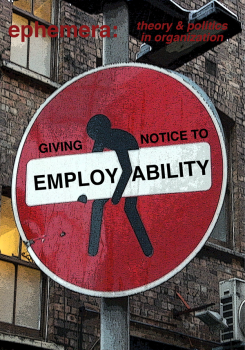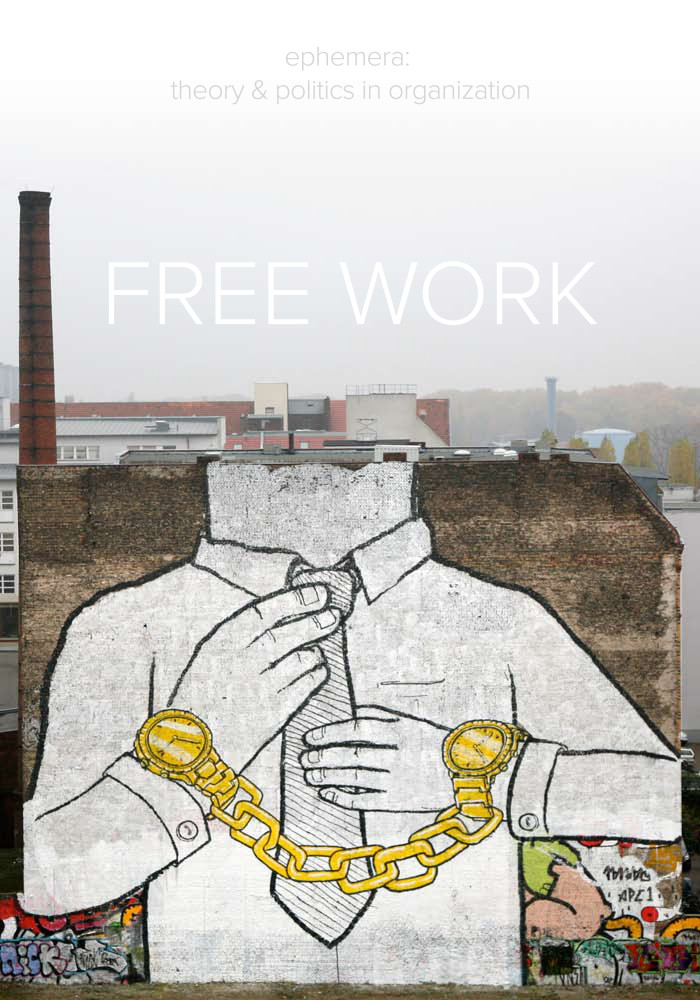Ephemera Journal 13(4): Giving Notice to Employability (2013)
Filed under journal | Tags: · employment, labour, neoliberalism, work

“The neoliberal notion of employability has risen to prominence over the past 20 years, having been positioned as the crux of national, organizational and individual prosperity. To be employable, individuals are increasingly called upon to be self-reliant; aligning themselves to the conditions of an ostensibly fast-moving and precarious global economy. This special issue of ephemera calls attention to the way this current preoccupation with employability tethers questions of equality and human development to the instrumental capitalist obsession with growth and renewal. The 13 contributions to this issue ‘give notice’ to employability as a colonizing attribute of human resourcefulness that promotes marginalization, exploitation and stigmatization. By exploring the type of ‘self’ employability demands, and analysing the consequences of its required engagement, we hope employability will be both noticed and acted upon.”
Edited by Ekaterina Chertkovskaya, Peter Watt, Stefan Tramer and Sverre Spoelstra
Published in November 2013
Creative Commons Attribution-NonCommercial-NoDerivs 3.0 Unported License
ISBN 9781906948214
View online (HTML and PDF articles)
Comment (0)Richard Sennett: The Craftsman (2008)
Filed under book | Tags: · craft, hand, history, labour, machine, technology, work

“Craftsmanship, says Richard Sennett, names the basic human impulse to do a job well for its own sake, and good craftsmanship involves developing skills and focusing on the work rather than ourselves. The computer programmer, the doctor, the artist, and even the parent and citizen all engage in a craftsman’s work. In this thought-provoking book, Sennett explores the work of craftsmen past and present, identifies deep connections between material consciousness and ethical values, and challenges received ideas about what constitutes good work in today’s world.
The Craftsman engages the many dimensions of skill—from the technical demands to the obsessive energy required to do good work. Craftsmanship leads Sennett across time and space, from ancient Roman brickmakers to Renaissance goldsmiths to the printing presses of Enlightenment Paris and the factories of industrial London; in the modern world he explores what experiences of good work are shared by computer programmers, nurses and doctors, musicians, glassblowers, and cooks. Unique in the scope of his thinking, Sennett expands previous notions of crafts and craftsmen and apprises us of the surprising extent to which we can learn about ourselves through the labor of making physical things.”
Publisher Yale University Press, New Haven and London, 2008
ISBN 0300149557, 9780300149555
326 pages
review (Lewis Hyde, The New York Times: Sunday Book Review)
review (Fiona MacCarthy, The Guardian)
Ephemera: Theory & Politics in Organization: The Free Work Issue (2013)
Filed under journal | Tags: · art, ethics, labour, theory, work

The relationship between freedom and work is a complex one. For some, they are considered opposites: ‘true’ freedom is possible only once the necessity of work is removed, and a life of luxury attained. For others, work itself provides an opportunity to achieve a sense of freedom and authenticity. In recent years for example, advances in human resource management have promoted hard work, a deep sense of commitment to one’s job, and the acceptance of working conditions that are ostensibly exploitative, as offering the promise of freedom. Recent corporate and entrepreneurial celebrations of playfulness also provide examples of the deep entanglement of contemporary forms of knowledge work with ideals of freedom.
In this issue of ephemera, our contributors inquire into the relation between freedom and work. They ask, for example, whether it is even possible to free oneself from ideals of freedom? Or is the fantasy of an imagined place of freedom, the utopia in which no work taints our lives, simply too prevalent? It may be the case that in contemporary life, we fool ourselves yet further when we ask for freedom within our working life. But can we free ourselves from the very prospect of freedom?
Volume 13, Number 1
Publisher ephemera editorial collective in association with MayFlyBooks, February 2013
Creative Commons Attribution-Noncommercial-No Derivative 3.0 Unported license
ISBN 9781906948160
201 pages
PDF
View online (HTML and PDF articles)
Back issues

